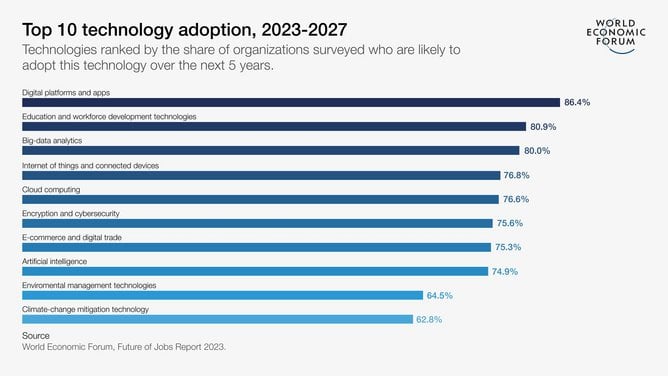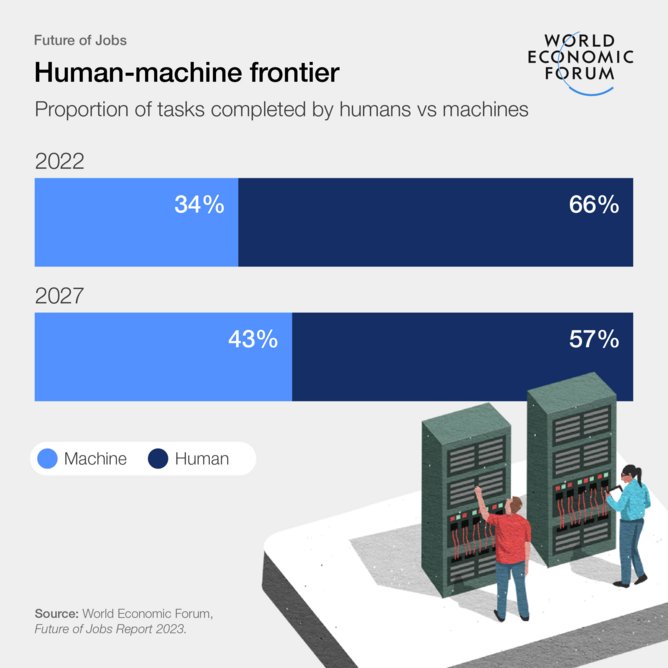Human-machine workforce shifts as AI continues to develop

The Future of Jobs Report 2023 according to the World Economic Forum predicts that technology is set to transform almost every job task. In particular, AI is set to continue growing in the next 5 years, but it has now been suggested that it will not take over human workforces as previously anticipated. The survey also conveys the scale of disruption that was inevitably caused by the COVID-19 pandemic, causing changes to multiple industries and workforces worldwide. As a result, there is a greater need for employees to adopt an even wider range of skills.
“Technology literacy is the third-fastest growing core skill.”
The Future of Jobs Report is an annual survey that explores how jobs and skills will evolve over the next five years. It focuses on the perspective of 803 companies who collectively employ more than 11.3 million workers worldwide. In analysing the expectations of these companies, it provides invaluable insights into how technology trends will shape future workplaces and how the workforce is set to transform over the next several years.
Technology adoption is set to remain a key driver of business transformation in the next five years. More than 85% of survey participants predicted that the adoption of new technologies and broadening digital access are most likely to drive the transformation of their organisations. In particular, those surveyed are mostly set to adopt and develop digital platforms and apps, with the below infographic suggesting that 86.4% will focus on this over the next five years.

The report also suggests that greater adoption of technology will remain a key driver of business transformation in the next 5 years. Whilst these developments are sure to see an overwhelmingly positive impact on the future of work, technology will ultimately shift the way that job tasks are performed. World Economic Forum suggests with their findings that increased technology adoption and digitalisation will continue to drive job transformation.
AI, big data and cloud computing are high on the priority list
- 75% of companies are looking to adopt greater AI technology in the next 5 years, including e-commerce and digital trade
- 86% of companies are expecting to incorporate these technologies into their business operations
- 81% of companies predicted to adopt the technology by 2027
AI will ultimately affect job profiles, with 75% of organisations planning to introduce AI over the next five years. These tools have the potential to free up workers’ time so that they can focus on higher-level tasks, which companies like Google DeepMind are already starting to implement.
“Whether you're ready or not, almost anything digital is going to change and become AI enabled,” states Jeff Maggioncalda, CEO at Coursera, the online learning company, as quoted by World Economic Forum.
Nearly one in four jobs are set to change as a result of growing AI trends and digitalisation, as well as greater transitions to green energy. Employers expect to create 69 million jobs by 2027 as a result of these developments, but this also comes with a net loss of around 14 million jobs.
The human-machine frontier has shifted

However, the report also finds that businesses are introducing AI and other types of automation into operations at a slower pace than previously anticipated.
- 34% of workers estimate business-related tasks are performed by machines
- 66% pf remaining tasks estimated to be performed by humans
- 42% of respondents predict that business tasks will be automated by 2027, revising down expectations
What is clear is that with these changes comes a massive need for upskilling, or reskilling. The survey findings show that 6 in 10 workers will require training before 2027, but currently only half of workers reportedly have access to adequate opportunities. In particular, the highest training priority for companies is currently analytical thinking, which is predicted to account for an average of 10% of training initiatives.
Two-thirds of companies expect to see a positive impact as a result of skills training within a year of their investment, in the form of enhanced cross-role mobility, increased worker satisfaction or enhanced worker productivity. It is clear that knowledge in AI and big data, as well as technological literacy, are deemed as essential by businesses going forward.
- OpenText’s Muhi Majzoub: Engineering Platform Growth with AIEnterprise IT
- OpenText CEO Roundtable: The Future of Safe Enterprise AIDigital Transformation
- OpenText AI: Empowering Businesses in Information ManagementDigital Transformation
- Microsoft in Japan: $2.9bn Investment to Boost AI & CloudCloud & Cybersecurity






